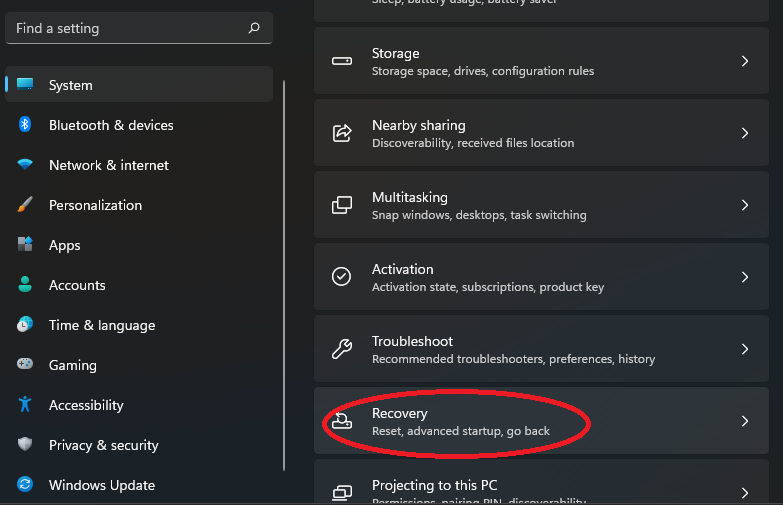The experience of your Windows 11 PC not waking up from long sleep can be horrible and frustrating at the same time. You have tried everything you could do to turn on your PC.. but all in vain. Don’t worry! This guide will provide you with 4 easy quick fixes that you can try to overcome this issue.
First of all, you need to know that it is a common problem. It can be easily fixed unless there is some serious internal issue behind it.
Also, as a precaution, you are requested to keep a backup of all your data on the PC. It is recommended so that no data gets lost while trying these tricks. Honestly, there is a slight possibility of data loss while trying these fixes on your Windows 11 PC. Keep on reading to Solve your issue!
Points To be discussed:
- Hard Reboot
- Changing the Power Plan Settings
- trying the Never Sleep Option
- SFC Scan
- Reinstalling Windows 11
- Seeking Professional Support
- Using the Windows Troubleshoot Feature
Also Read: How To Remove Shortcut Arrow Icon In Windows 11
Solved- Windows 11 after long sleep need to reactivate issue
Without being too wordy, let’s dive into the topic. So here, we are going to provide you with 4 tricks/ quick fix methods to help you overcome the issue of Windows 11 PC not waking up after long sleep.
1. Hard Reboot
The first and the most obvious trick you can try is to perform a quick hard reboot or restart. In the hard reboot, you don’t go to the power option in the Start Menu and Click on Restart. Instead, Press the Power Button (power button is a button usually used to turn on the computer) for a few seconds until the PC turns off. Now, wait for a moment. And then, press the Power button again until the PC turns on.
2. Changing the Power Plan Settings
This method is the first quick fix or method recommended to turn on your PC from Sleeping mode. So, you just need to follow a few simple steps given below:
- Go to the Search box from the taskbar and enter Control Panel in the Search box. Now under best match, tap open Control Panel.

- From the Control Panel Screen, Click on Category next to View by option on the top-right corner as given below. Then, click on Large Icons.

- Then, the All Control Panel Items window will open up. Select Power Options from various options available on the screen.

- Now, Click on Change Plan Settings next to the Power plan setting you have chosen.
- Click Change Advanced Power Settings as given below. Now, a Power Options windows Will pop up.

- Click on the Plus(+) icon next to PCI express.
- Tap the Plus(+) icon next to Link State Power Management.
- Then under Link state Power Management, turn the Setting to Off.

- Select Apply and then Click on OK.
We hope it solves your issue and if not, then we have some other tricks to try. Keep on reading to solve the issue of Windows 11 PC not waking up from long sleep.
Also Read: How To Change Name Of User Profile Folder In Windows 11
3. Turning the Sleep option to ‘Never’
Another Quick Trick that you can try is to Turn the Sleep option in the Control option to ‘Never’. So, follow a few very easy steps to perform this fix:
- Go to the Control Panel of your PC. You can find it in the Start Menu. Alternatively, you may choose to get to it by Searching Control Panel in the Search Box, you may want to click on the Control Panel option under Best Match as given below.

- Now, Go to the Power Options in the Control Panel. If you are not able to directly Spot it then Click on Category next to View By on the top-right corner and then select Power Options from numerous options appearing on the screen as given below.


- On the power Options window, Click on the Change When the computer sleeps option.

- Next, you need to click on the drop-box beside parallel to Put the computer to sleep and choose Never from the drop-down menu.
- Then, Choose to save changes and you are done.

If this Setting also doesn’t resolve your issue, you can do one more thing which is discussed below in this article.
There is one thing you need to consider while switching your PC’s sleep setting to ‘Never’. Switching off your PC’s Sleep setting can lead to a fast battery drainage problem. Additionally, it can lead to some more minor issues. But don’t worry. However, If you are choosing this setting temporarily, it is not much of an issue.
Also Read: Dolby Atmos Not Working In Windows 11? Fix It Now
4. SFC Scan Command
If the previous method didn’t work, you can try the SFC scan command on your Windows 11 PC. This command finds out and repairs the Corrupted system. So, to try this quick fix, you need to follow a few steps which are mentioned below:
- Go to the Search Menu and type cmd in the search box. Under best match, there will be Command Prompt option.

- Right-click on the Command Prompt and choose run as administrator.
- Then select Yes to the User Account Control Prompt.
- Now, type the SFC /scannow command and press Enter.
- Wait until the verification is completed 100%.
- Now, type exit and hit enter.

This way all the corrupted files will be repaired and replaced with a cached copy.
Alternatively: Reinstall Windows 11
If nothing seems to works, you can choose to reinstall Windows 11. This can be done in a few simple steps as given below:
- Go to the Settings on your PC. On Windows 11, you can do it by pressing the key combination Windows+ I. Alternatively, you can also get to Settings from the Start Menu.
- Now, Click on System and Select Recover from the Right Pane.

- Under Recovery Options, click on the Reset PC option next to Reset this PC.

- Next, select the Keep my files option.

- Now, the will be two options available on the screen: Cloud Download and Local Reinstall.

- Cloud Download will re-download Windows 11 from the internet and install it on the PC whereas Local Reinstall will use the Windows 11 file that is already there on your PC.
- Choose Accordingly.
- Click Next and then Reset.

Note: Undoubtedly, since you had selected Keep my files option, your files will be saved on your PC. However, most of your settings and apps will be removed. So, perform this trick at your own risk.
But, this method can prove to be helpful if you have tried all the other methods to wake up your PC from Sleep mode. So, as a last resort, reinstalling windows 11 can be a good option.
Professional Support
When no quick fixes or tricks seem to work, it is a signal that there is a serious internal issue on your Windows 11 PC. It is a rare case as mostly, one of the above-mentioned tricks fixes the issue of PC not waking up from Sleep mode. However, in this scenario, Seeking the help of a trained professional will be beneficial for your PC as they will access the internal problem and fix them.
Utilizing the Troubleshoot Feature of Windows 11
The troubleshooting feature is a good start if you are having an issue with your PC. This feature allows you to find out the internal issue your PC may be facing. Running the Windows Troubleshoot feature is not a bad idea. So, to run the Windows 11 troubleshoot feature, perform the following steps:
- Open the System Settings. You can do this by Pressing the key combinations Windows +I. Else, you can to Settings from the Start Menu.
- Now, Click on System(On the left) and Select Troubleshoot by scrolling down on the Right pane.

- Select the Other Troubleshooters option from the right pane.

- Now, you need to select the kind of troubleshooting you would like to run. In this scenario, Windows update troubleshooting is recommended. Now run the troubleshooter and answer the questions which may appear on the screen.

If no internal issue is found after running the troubleshooting, it doesn’t imply there is no problem with the system. However, troubleshooting is still a good way to spot internal issues. So, Running a troubleshooter is not a bad idea.
Summing Up
So, that’s all for now. Every problem has a solution. So here, we have written this article to discuss various quick methods you can try to issue of Windows 11 PC not waking up after a long sleep. If the first four quick tricks do not work, you can try the alternatives mentioned just below them. However, if the issue still persists (Which is a rare case scenario), you may resort to seeking professional IT support from Microsoft.

































